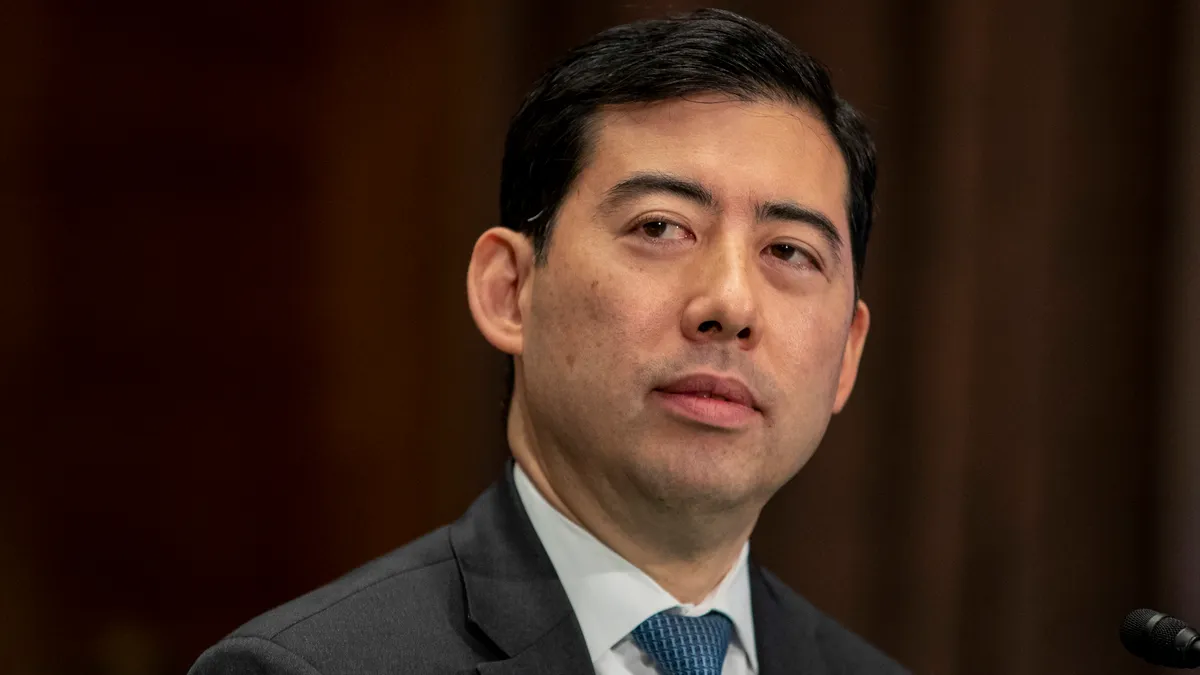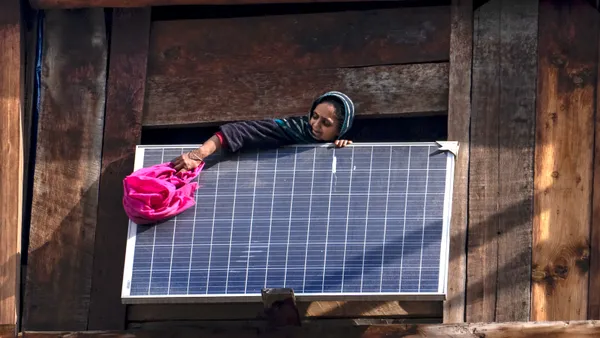Dive Brief:
- Acting Securities and Exchange Commission Chair Mark Uyeda has instructed the agency’s staff to ask the U.S. Eighth Circuit Court of Appeals not to schedule arguments for the agency’s climate-risk disclosure rule, as he has a different opinion on the SEC’s authority to promulgate the rule, according to a Tuesday statement.
- Uyeda cites his and Commissioner Hester Peirce’s initial objections to the rule, a reconfigured agency and President Donald Trump’s regulatory freeze order as reasons to delay the case. However, fellow Commissioner Caroline Crenshaw — who voted to approve the rule — said in a separate Tuesday statement that Uyeda’s order was given “without the input of the full Commission.”
- The climate-risk disclosure rule was finalized and approved last March under then-SEC Chair Gary Gensler, before being stayed in April due to multiple legal challenges, all of which were later consolidated into the Eighth Circuit. Though the agency issued its brief to court last August, Uyeda asked the court for time “for the Commission to deliberate and determine the appropriate next steps in these cases.”
Dive Insight:
After receiving mounting criticism for its original 2022 proposal, the version of the SEC climate risk disclosure rule that the agency finalized and approved included a more limited universe of public companies that would be required to report scope 1 and scope 2 emissions. The revised rule also eliminated a scope 3 emissions reporting requirement. The Commission approved the rule on a 3-2 vote, with Uyeda and Peirce in opposition to its passage.
Uyeda has consistently disagreed with the opinion that the SEC has the authority to require the disclosures and said Tuesday he “continue[s] to question the statutory authority of the Commission to adopt the Rule, the need for the Rule, and the evaluation of costs and benefits.”
“The Commission’s briefs previously submitted in the cases consolidated in the Eighth Circuit do not reflect my views,” Uyeda said in the Feb. 11 statement. “The lack of statutory authority is a weighty factor. Commissioners have a constitutional obligation to determine the bounds of the agency’s statutory authority, and my views on the Commission’s authority here were the result of lengthy study and research informed by many comments on all sides of the issue.”
Crenshaw said that while she “wholeheartedly” agrees with Uyeda that agencies and their leaders must act within the bounds of their constitutional and statutory authority, she maintains the agency was within its rights to pass the rule.
“I dispute with equal vigor the notion that the agency acted outside of its remit. It did not,” Crenshaw said. “The only things that have changed since the Rule was passed have been matters of politics and not substance. As such, I disagree with the position unilaterally taken today by the acting Chairman.”
Crenshaw’s Tuesday letter reiterates that the public comments for the rule, of which there were over 24,000, included many investors who had spent years asking for “consistent, comparable and reliable climate risk disclosures.”
At the time of passage and in the weeks after, Uyeda debated the agency’s authority to promulgate the rule and said the rule requires information not financially material to investors. Meanwhile Crenshaw maintained that, not only was the rule within the agency’s remit, it had the authority to go further and maintain the proposed rule’s greenhouse gas reporting universe, including requiring scope 3.
The climate rule was challenged by a number of parties, including public oilfield services company Liberty Energy, whose CEO at the time of the litigation, Chris Wright, is now serving as Secretary for the Department of Energy. Uyeda’s letter said the “Commission will promptly notify the court of its determination about its positions in the litigation.”
With Trump back in the White House and steering a deregulatory climate agenda, experts have predicted that the SEC’s climate risk rule could end up on the chopping block.
“I think there will be political pressure under a Trump administration for the SEC to back away from the final [climate] rule,” Julie Anderson, a professor and program director for the sustainability management program at American University’s Kogod School of Business, previously told ESG Dive.
However, climate disclosure rules remain in effect in California, the European Union and other jurisdictions that will require large public companies to report on their climate risks. A version of California’s disclosures were recently reintroduced in New York’s state legislature.











